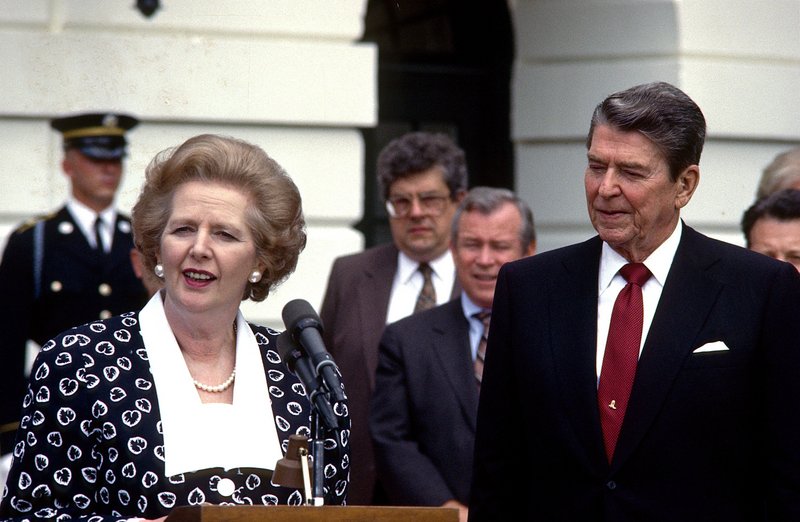She had a clear vision and a blunt way of expressing it, and for 11 years as British prime minister, Margaret Thatcher wasn’t afraid to dispense tart advice to successive U.S. presidents.
“This is not the time to go wobbly, George,” she told President George H.W. Bush after Iraq invaded Kuwait in August 1990.
It was vintage Thatcher, a message that was made possible by her cultivation of the closest possible relations with Bush and, before him, Ronald Reagan, in part to shore up her image in Britain and in Europe as the embodiment of what was then a special U.S.-British relationship.
But only she could have gotten away with offering such advice over the telephone to an American president.
Thatcher, who died Monday at age 87, was a towering figure in modern European politics. Her legacy shows the outsize impact that a middle power can have on world affairs if led by a smart, determined and gutsy person — in this case the first woman to serve as prime minister.
She had a special talent for spotting trends — predicting the demise of communist rule, which actually happened while she was in office — and talent, such as when she identified Mikhail Gorbachev as a promising future leader of the Soviet Communist Party. “I like Mr. Gorbachev. This is a man I can do business with,” she said.
And though she despised communism with a passion, she delighted in being called the “Iron Lady,” the epithet given her by the Soviet Army newspaper Red Star in 1976, before she was prime minister. She quickly took it on as her own, telling parliamentary constituents a week later that she was proud to wear a “Red Star” evening gown and serve as “the Iron Lady of the Western world.”
Her trademark was to state her principles and adhere to them, even when they led to direct clashes with top U.S. leaders, or, early in her time in office, to war. She took on her country’s national coal miners union early in her term, provoking a strike, which ended with the unions losing much of their power.
She also took on Britain’s welfare state and attempted to replace the cradle-to-grave free government services with a more competitive society.
When the Argentine military junta invaded the Falkland Islands (which Argentina calls the Malvinas) in April 1992, she ignored the misgivings of her Cabinet and the lack of support from Washington and sent a British military task force 8,000 miles away to dislodge the invaders.
She had the reputation of being utterly humorless, but in the European Union, where she attempted to give Britain a unique role and to head off any move that would shed the political sovereignty of Parliament, she traded barbs with her fellow European leaders, who made no secret of their dislike for her.
Peter Gregson, a former Reuters reporter who covered Thatcher for her final four years in office, recalled that at a meeting to discuss strengthening European central authority, French President Jacques Chirac charged Thatcher with putting her foot “firmly on the brake of Europe.” She shot back, “That’s rich, coming from him. He hasn’t even gotten in the car yet.”
Reporters who covered her recalled that she would sometimes put her personal touch on party and even travel arrangements. At No. 10 Downing Street, the prime minister’s official residence in London, the Iron Lady “was as much in control of domestic matters as she was of the country’s politics,” recalled Barry May, a former Reuters correspondent. He recalled a Christmas party where he saw Thatcher, clutching her handbag, “fussing over the curtains and ordering flunkies about,” and taking no rebuttals from anyone.
Thatcher also had the gift of a great politician to be able to completely ignore her own shaky base and to carry on regardless. She was in Aspen, Colo., on the day that Iraqi dictator Saddam Hussein sent his forces into Kuwait. Bush, after holding early meetings on the crisis, flew to Colorado for a long-planned meeting.
There she told Bush that appeasement in the 1930s had led to World War II, and she warned that Saddam soon would have the Persian Gulf at his feet and 65 percent of the world’s oil supply with it, according to Thatcher’s memoirs. Her forceful delivery at a news conference, compared with Bush’s hesitations, left the impression that Thatcher had tried to strengthen his backbone.
All the while, Thatcher, who had seemingly lost interest in British domestic affairs, was losing support among her own Conservative Party, which decided at a subsequent party conference to oust her as party leader. In November 1990, the party replaced her with John Major, a high school dropout whose calm demeanor, businesslike style and seeming lack of any ideology was a near-complete contrast.
Copy the Story Link
Send questions/comments to the editors.



Success. Please wait for the page to reload. If the page does not reload within 5 seconds, please refresh the page.
Enter your email and password to access comments.
Hi, to comment on stories you must . This profile is in addition to your subscription and website login.
Already have a commenting profile? .
Invalid username/password.
Please check your email to confirm and complete your registration.
Only subscribers are eligible to post comments. Please subscribe or login first for digital access. Here’s why.
Use the form below to reset your password. When you've submitted your account email, we will send an email with a reset code.